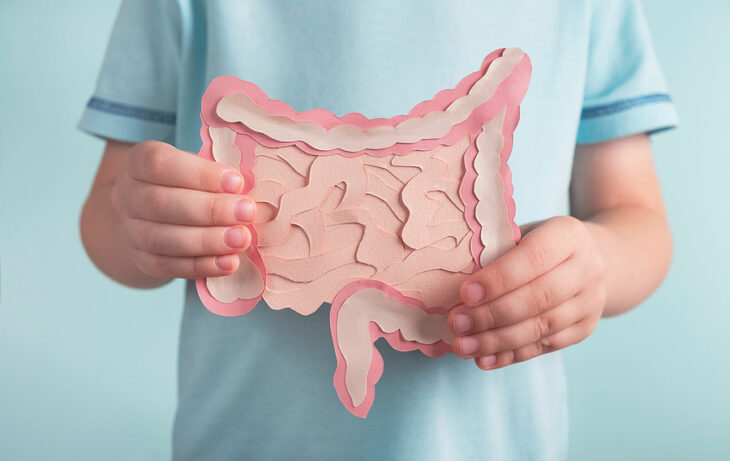By Dr. April Ulmer
The variety and number of microorganisms that live in the human gastrointestinal tract outnumber the stars. We call this critter conglomeration the “gut microbiome.” Scientists recently have found that the bacteria in our guts determine much more than our pooping habits or how quickly we recover from a stomach virus. In fact, gut bacteria have been linked to someone’s risk of developing heart disease, Alzheimer’s, obesity and other conditions.
One of the more recent studies not only evaluated how gut bacteria affect women’s obesity risk, but also whether that risk was passed on to newborns. This study and others revealed that in utero, a growing baby’s gut gets colonized with many of the same bacteria that occupy the mom’s gut. If a mother’s gut bacterial profile is linked to obesity, her baby is at marked risk for developing obesity. Such groundbreaking research shows that not just genetics, but a gut bacteria profile, determine someone’s risk of developing certain diseases.
Conversely, a healthy, well-balanced gut can protect us and reduce our risk of developing certain diseases.
Some relatively simple habits can ensure that your gut, and your children’s, stay as healthy as possible.
1. FIBER:
When most people think of fiber being good for your gut, they are associating the fiber with easier bowel movements. Increasing dietary fiber is indeed associated with more hydrated, easier-to-pass stools, but that’s not all that makes fiber important. The “good” bacteria in your gut love fiber. It serves as a form of prebiotic, or “bacterial food,” for the “good bugs.” If you feed the good, anti-inflammatory bacteria, they thrive and multiply like any other organism. If their numbers are strong, they will outnumber the pro-inflammatory bacteria that put us at risk for disease.
It’s a simple matter of tipping the scales toward the “good bugs” to minimize inflammation and promote good overall health. How much fiber does someone need daily? Toddlers and children under age 5 need an average of 10 grams per day. For children ages 5 and up, a simple rule of thumb is the child’s age plus five grams per day. For example, if your child is 7, he or she needs an average of 12 grams per day. Adult women should shoot for 21 to 25 grams, and adult men should get 31 to 40 grams.
2. SHOP THE PERIPHERY OF THE SUPERMARKET:
Fresh foods like fruits, vegetables and lean meats are considered “anti-inflammatory,” whereas processed foods full of fillers and artificial colors, flavors and preservatives are “pro-inflammatory.”
As a mom myself, I understand that sometimes, you just gotta feed them, which translates to, “It’s chicken nuggets and fries tonight.” Just don’t give up on teaching your kids to love natural foods and understand the importance of eating them from an early age. If you succeed, it will be one of the greatest gifts you could ever give them.
3. ENCOURAGE HEALTHY STOOLING HABITS:
Work to make your children comfortable talking to you about their stooling habits. Also, encourage them to stool when their body says to if it’s socially appropriate at that time. Teach your child that, when your body says it’s time to poop, it’s important to stop what you’re doing, find a restroom and poop — even if that means pausing cartoons or coming inside from playing. Fiber and probiotics sometimes help promote regular stooling, as well as certain medications when appropriate. Consult your child’s pediatrician or a tummy doctor if you have questions about whether your child’s stooling frequency or consistency is adequate.
4. USE PROBIOTIC THERAPY WHEN APPROPRIATE:
Probiotics are regarded as safe in most people, including children. As a rule, only prescription probiotics should be used for infants and rarely are needed. Studies have shown that even when probiotics are helpful, if you stop their use, the gut’s colonization reverts to its original state. Therefore, for probiotics to have lasting presence, someone would have to continue taking them indefinitely, which is just not practical in most instances.
I recommend probiotic use only in specific circumstances, such as the treatment of antibiotic-associated diarrhea or mild constipation. Which probiotics are best? There is no one answer. We know certain bacteria are best for certain ailments, such as Bifidobacteria for constipation, but as far as how many colonies and which combinations of “bugs” are ideal? No one really knows for sure.
Probiotics are a hotbed of research, and the scientific community is working hard to unravel the mystery of the gut microbiome. The goal is to one day be able to prescribe a very specific combination of “gut bugs” to not only treat ailments, but also to protect from development of specific diseases. Such a breakthrough could change the practice of medicine and gastroenterology as we know it. But until then, just pick up an over-the-counter probiotic that is in a form that you can get your child to take (e.g., powder, gummies, chewable tablets for younger kids and capsules for older).
Of course, these are just a few tips for a happy, healthy gut microbiome. You can support your GI tract in many ways, so do your research and choose what’s practical for you and your family. Focus on teaching and creating lifelong healthy habits, such as exercise, hydration, and consumption of fresh, colorful fruits and vegetables. Use fiber or probiotic supplements when necessary.
Most importantly, never underestimate the power of your gut and its amazing bugs!
Dr. April Ulmer, a.k.a. “The Tummy Dr.,” is a board-certified pediatric gastroenterologist who practices at Kids and Tummies in Gulfport. Reach her at thetummydr@gmail.com.


